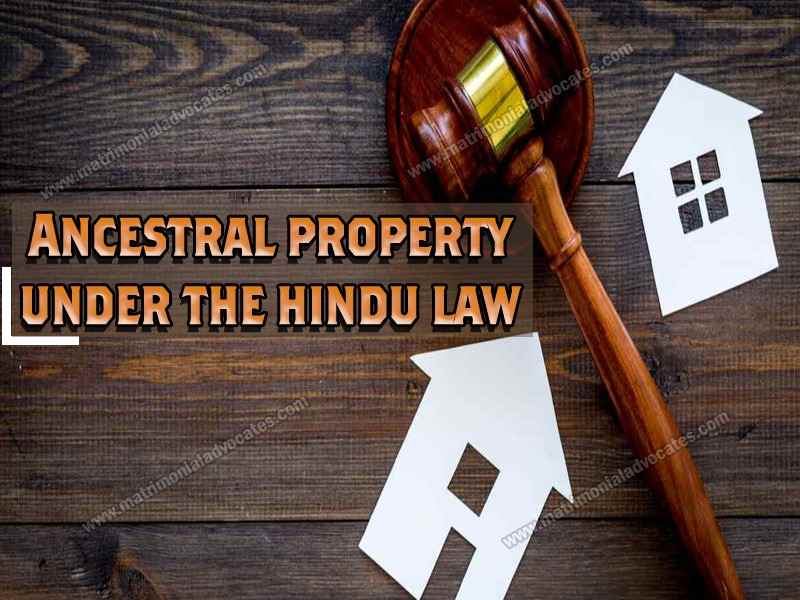
CONCEPT
All property inherited by a male Hindu from his father, father’s father, and father’s father is ancestral property as regards, his son, grandson and great grandson.
Legally speaking, an ancestral property is the one which is inherited up to four generations of male lineage. The right to a share in an ancestral property accrues by birth itself, unlike other forms of inheritance, where legacy opens upon the death of the owner. Property inherited from any other relation is not ancestral property but it is the separate property of the person inheriting it.
Mitakshara School
The essential feature of the ancestral property according to Mitakshara law is that the sons, grandsons and great grandsons of the person who inherits acquired an interest in it by birth. Their rights attach to it by their birth
Dayabhaga School
According to Dayabhaga the male issue of the inheritor do not acquire any interest by birth in such property as they do according to Mitakshara law.
INCIDENTS
Following are the incidents of Ancestral property:
- The ancestral property should be four generations old.
- The property should not have been divided by the members. When the division/partition happens, it becomes the self-acquired property and not ancestral property.
- The person has the right over the property right from birth.
- The ancestral property rights are controlled by per stripes and not by per capita.
- The shares are first determined for each generation and subdivided for the successive generation.
OBSTRUCTED AND UNOBSTRUCTED HERITAGE
Property inherited by a Hindu from a person other than his father, grandfather or great grandfather is obstructed heritage. It is called obstructed because the accrual of the rights to it is obstructed by the existence of the owner. Property received through obstructed heritage is not ancestral property because it is not inherited from any one of the three immediate paternal ancestors, i.e., father, father’s father and father’s father.
Ancestral property is unobstructed heritage. The essential feature of unobstructed heritage, according to Mitakshara Law is that the sons, grandsons and great grandsons acquire the property inherited by birth. Their rights attach to it by their birth. The property is called unobstructed because the accrual of the right to it is not obstructed by the existence of the owner.
Thus, if A inherits property from his father or grandfather or great grandfather it is ancestral property or unobstructed heritage in the hands of A as regards the male issue because the existence of A an obstruction to his son acquiring an interest but as regards other relations he hold it as his absolute property. If A has not male issue, other relation has no interest in the property during the life-time of A.
CLASSIFICATION UNDER HINDU LAW
The senior-most member of the Hindu family is known as Karta. The other members of the family are known as Coparcener. It is a relation to the father who can offer funeral cake. The concept of Coparcener has both spiritual and legal aspects. Coparcener is the person who acquires interest on property right from birth. Coparcenary owns the unity, possession and ownership of the title.
The Coparcenary property is further divided in two forms Ancestral Property and Joint Family Property which is not an ancestral property. The property under following classifications falls under the ambit of ancestral property:
Property from paternal ancestors
Here, the Hindu male inherits the property from his father, father’s father, father’s father’s father. In other words, property acquired from any one of the three immediate paternal ancestors. Such property is considered as ancestral property.
- Property from maternal ancestors
Any ancestral property inherited from the maternal ancestors is termed as separate property and not ancestral property.
- Property from the females:
Any property inherited by the females of the house doesn’t come under the ancestral property. The property brought by women is considered as her separate property.
- Property obtained through gift/Will from paternal ancestors
When a property is obtained by gift/Will from his ancestors, it can be either considered as ancestral or self-acquired property. It depends on the intention of the ancestors as mentioned in the deed/Will. If the ancestors make a condition that the inheritor should take the property for the benefit of the family, then it is ancestral property. If no condition is made, it is considered separate property.
- Other property
Any property which is bought from the income of the ancestral property is known as ancestral property. So anything purchased with the assistance of ancestral property is also called as ancestral property. The children, grandchildren, great-grandchildren possess an interest over the income and accretion even before their birth.
RIGHTS OF ILLEGITIMATE CHILD
As per section 16(3) of the Hindu Marriage Act the illegitimate child is prohibited to acquire any property other than his parents. However the Supreme Court took different view and has done the interpretation of the section 16(3) in the case of:
Revanasiddappa & Anr vs Mallikarjun & Ors on 31 March, 2011
The Supreme Court has held that under the Hindu Marriage Act (HMA), illegitimate children are entitled to all rights in the property of their parents, both self-acquired and ancestral. The Bench said: “the prohibition contained in Section 16 (3) will apply to such children with respect to property of any person other than their parents. We find it interesting to note that the legislature has advisedly used the word ‘property’ and has not qualified it with either self-acquired property or ancestral property. It has been kept broad and general.”
Underlining the need for a liberal interpretation of Section 16 (3), the Bench said: “with changing social norms of legitimacy in every society, including ours, what was illegitimate in the past may be legitimate today. The concept of legitimacy stems from social consensus, in the shaping of which various social groups play a vital role. Hence, children would have a right to whatever “becomes the property of their parents whether self-acquired or ancestral.
KEY ASPECTS OF ANCESTRAL PROPERTY
The key aspects of ancestral property under Hindu personal laws and the regulatory framework pertaining to the functioning and devolution of ancestral property in India can be summarized as under:
- While the Hindu Succession Act, 1956 and other legislations are silent on the aspect of the definition of “ancestral property however, the HSA is the primary statute which governs the manner in which the property will be devolved and disposed off by the legal heirs to any such property. The HSA was amended by the Hindu Succession (Amendment) Act, 2005 (“2005 Amendment”), which introduced certain fundamental changes to HSA. While the 2005 Amendment was repealed by the Repealing and Amending Act, 2015, the Courts in India have held that the fundamental changes brought through the 2005 Amendment still hold applicable. In addition to the HSA, the other laws which are applicable to ancestral property include inter alia the Transfer of Property Act, 1882 (“TPA”) and Hindu Minority and Guardianship Act, 1956 (“HMGA”).
- Ancestral property has traditionally been held by a joint Hindu family consisting of male coparceners and was traditionally governed by the Mitakshara school, wherein property descends only through the male line as only the male members of a joint Hindu family have an interest by birth in the joint or coparcenary property. This has also been elucidated by the SC in Rohit Chauhan v. Surinder Singh and Ors. (2013)9SC C 419
The SC has held that “Coparcenary property means the property which consists of ancestral property and a coparcener would mean a person who shares equally with others in inheritance in the estate of common ancestor. Coparcenary is a narrower body than the Joint Hindu family and before commencement of Hindu Succession (Amendment) Act, 2005, only male members of the family used to acquire by birth an interest in the coparcenary property. A coparcener has no definite share in the coparcenary property but he has an undivided interest in it and one has to bear in mind that it enlarges by deaths and diminishes by births in the family.
- An ancestral property divided/ partitioned through a partition deed, family arrangement, etc. loses its ancestral character. The prerequisite of an ancestral property is that an ancestral property should not have been divided or partitioned by the family members, as once a division of the ancestral property takes place, the share or portion which each coparcener gets after division becomes his or her self acquired property. After partition, the share which a coparcener obtains on partition of ancestral property is ancestral property as regards his male issues.
Here too, SC held that “so long, on partition an ancestral property remains in the hand of a single person, it has to be treated as a separate property and such a person shall be entitled to dispose of the coparcenary property treating it to be his separate property but if a son is subsequently born, the alienation made before the birth cannot be questioned. But, the moment a son is born, the property becomes a coparcenary property and the son would acquire interest in that and become a coparcener.”
- Prior to the 2005 Amendment, daughters were not entitled to inherit ancestral property as sons. The 2005 Amendment had brought about a significant change by entitling the daughters a share in the ancestral property along with their male siblings. At present, the daughters are entitled to same rights in the property of her father as that of the father’s son. However, daughters cannot inherit ancestral property if father has died before 2005.
- The Supreme Court in Prakash v. Phulavati (2016)2SC C 36has held that the rights under the 2005 Amendment are applicable to living daughters of living coparceners as on September 9, 2005, i.e. the date of commencement of the 2005 Amendment, irrespective of when such daughters are born. The Court further held that the 2005 Amendment stipulates that a daughter would be a coparcener from her birth and would have the same rights and liabilities as that of a son.
- The 2005 Amendment was repealed by way of Repealing and Amending Act, 2015. However, the Karnataka High Court has said that the Repealing and Amending Act, 2015, does not wipe out the amendment to Section 6 of the HSA, as per which the daughters were treated as coparceners on par with sons vis-à-vis the coparcenary property and accordingly does not take away the status of a coparcener conferred on a daughter giving equal rights with the sons in the coparcenary property.
- The position with respect to management of minor’s share in any immovable property has been examined under Section 8 of the HMGA, which states that the natural guardian of a minor, in order to deal in any manner or dispose off the immovable property of the minor has to seek permission from the Courts in India. However, this rule does not apply when the minor has an undivided interest share in the HUF property and the property is under the management of an adult member or Karta of the family.
- Further, as regards the rights of the coparcener, it is to be noted that a single coparcener who is not the managing member of the joint family property cannot be sued on behalf of the family or sue to recover a particular portion of the joint family property for himself.
Phoolbas Koonwur v. Lalla Jogeshur (1876) 3 IA 7: 1 Cal 226
In this case the Court held the only remedy by one member against his co-sharers for possession is by a suit for partition, and until then he has no right to the exclusive possession of any part of the said property.
Hira Lal v. Pearey Lal ILR (1939) All 897
In this case the court held that the underlying principle is that there is community of interest and unity of possession between all the members of a coparcenary and each coparcener is entitled to joint possession and enjoyment of the joint family property. A coparcener who is excluded from his right in respect of joint possession and enjoyment is entitled to an account of the income derived from the joint family property and to have his share of the income ascertained and paid to him, i.e. mesne profits, as well as enforce his right to joint possession of any property from which he is excluded.
CONCLUSION
The concept of ancestral property has been in existence since time immemorial; however the term has not been defined in any of the legislations governing the inheritance and succession of property amongst the members of a family lineage. Under generally approved and accepted sense, the term “ancestral property” means any property inherited up to four generations (including the holder of the property) of male lineage from the father or father’s father or father’s father’s father i.e. father, grandfather, great grandfather. In other words, property inherited from mother, grandmother, uncle and even brother is not an ancestral property. By an interpretative process, the Honourable Supreme Court has in the case of Prakash & Ors.vs. Phulavati, held that the rights under the 2005 Amendment are applicable to living daughters of living coparceners as on September 9, 2005, i.e. the date of commencement of the 2005 Amendment, irrespective of when such daughters are born, also coming to the question of rights of illegitimate child the Apex Court held that illegitimate children are also entitled for ancestral property.
It is evident that courts in India played an important role in shaping the concept of ancestral property. Conclusively it can be said that the Courts in India, however, every now and then, have come to rescue, at-least to clarify the position of law with respect to ancestral property in India.





